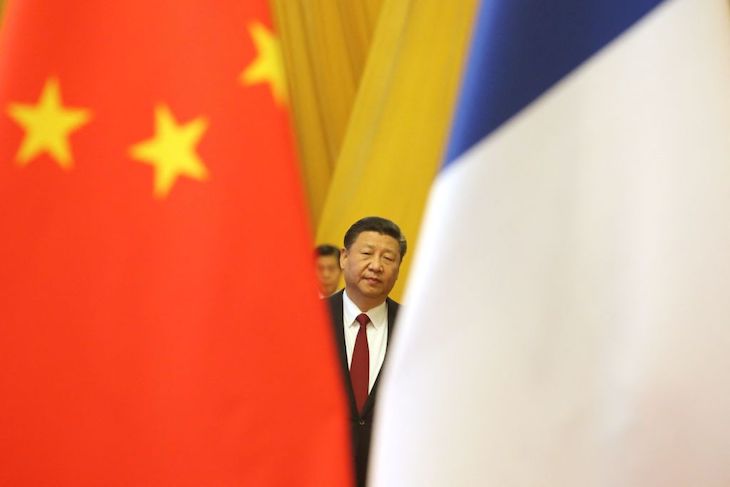Electric cars made in China could be turned off remotely, immobilising them instantly and crippling the West. That terrifying prospect was highlighted by Professor Jim Saker, president of the Institute of the Motor Industry. ‘The car manufacturer may be in Shanghai and could stop 100,000 to 300,000 cars across Europe thus paralysing a country,’ Saker warned. Yet few people seem bothered.
Nor was there much reaction to Tory MP Iain Duncan Smith’s claim on LBC this week that Beijing may have used a hidden device in Rishi Sunak’s car to track the PM’s movements. If this allegation involved another country it would likely have lead the headlines for days. But, because it’s China, nobody is alarmed.
During the height of the Cold War, it was hard to escape from the ‘Red Scare’. Films and TV during the 1950s and 60s were bristling with sinister communist spies and agents, fiendish Russian plots and defections and men meeting on park benches whispering ‘the swallows are flying backwards over Prague this year’. This time around, the threat posed by the Chinese Communist Party (CCP) is pushed into the margins.
Just Stop Oil target mums on the school run but shy away from direct action against Beijing
Isn’t it weird how we don’t care much about China? Our pop culture and discourse is obsessed by prison camps and dictatorships. We’re fixated with standing up for those mysterious values of inclusion, diversity, and so on. Yet there is, right now, a totalitarian regime that, on clear evidence, has imprisoned people in labour camps on ethnic lines. You’d think more people would notice, that it would be a hot topic. Maybe if we really cared about our ‘values’ – enough to make us overlook the convenience of a pipeline of cheap stuff – it would be more of a talking point.
China, of course, was also the origin of a virus that caused an estimated seven million deaths and unleashed economic destruction and concomitant immiseration on a mass scale. And our reaction now is a shrug of ‘oh well’.
We talk all the time about climate catastrophe and the race towards the enormously expensive goal of Net Zero. But when it comes to taking action against the biggest polluter – China – we’re not particularly bothered.
Perhaps this apathy is because reports of hidden Sim cards and viruses escaping from labs sound ludicrous. Like Hollywood clichés, it’s hard to take them seriously. The Western entertainment industry did too good a job predicting this stuff, making us smirk when it turns up in real life; the sinister hidden ‘extra’ microchips in consumer electronics goes back at least as far as a 1968 Doctor Who story where the Cybermen were the rotters behind it; by 1982, and Halloween III: Season Of The Witch it already felt a bit old. Now that it might actually be happening, it’s hard to know how to react. To those of a certain age the coming of Covid was so exactly like the plague scenario depicted in the opening titles of the BBC’s 70s drama Survivors – a masked Chinese scientist dropping a flask (butterfingers!) and then hopping on a plane – that it seemed almost comical.
Another reason we bury our heads in the sand about China is that we just cannot help being parochial. Chinese names can be hard for Westerners to remember or pronounce. In the last days before the national curriculum, my school put us through an O Level module on twentieth century Chinese history. Everyone got hopelessly confused. It was impossible not to muddle up Chiang Kai-Shek, Sun Yat-Sen and Wang Jingwei. I can’t help thinking that if the current CCP was filled with people called Oliver or Angela we might be more interested.
Even the eco lobby – the likes of Just Stop Oil and Extinction Rebellion – are turning a blind eye to China. They target mums on the school run in south London, but shy away from direct action against Beijing. What are they afraid of? Whatever the reason, their lack of engagement with mega-polluting China reveals their actual motive: to annoy fellow Westerners that they don’t like. This isn’t because of denial or unconscious bias on their part, just that China’s polluting factories seem so far away to our feeble, evolved-for-locality human minds. It’s too much trouble to think about problems elsewhere. We are rarely prepared to make the effort.
One person who did call out China was Donald Trump, and look where that got him. Trump’s appellation of Covid as ‘the Chinese virus’ made Western politicians and the media wince: it sounded a bit racist, and brought back uncomfortable memories of Sax Rohmer’s Fu Manchu or Ming The Merciless. But if Trump’s phrase made us uneasy, it wasn’t only because of his language: he was one of the few Western politicians willing to stick it to Beijing over Covid and the botched cover-up of what really happened in Wuhan in 2019.
Trump is gone, for now – and few politicians are willing to confront Beijing. But perhaps we shouldn’t worry that the threat posed by the CCP isn’t more of a talking point. Hopefully, someone somewhere is aware of the actual dangers posed by president Xi and his acolytes and is taking the necessary steps for our protection. Maybe MI5’s hilarious rebranding as an inclusive employer is a cunning smokescreen, behind which it remains a ruthless, well-oiled counter-espionage outfit that doesn’t make such silly considerations a priority.
Let’s hope so. But in the mean time, we ought to pay more attention to the threat posed by China’s leadership, and trust less to the highly scientific probability index known as ‘you never know, something may turn up.’ Or maybe it’s one of the increasing array of things that will only strike us – right in the kisser – when it’s too late.







Comments